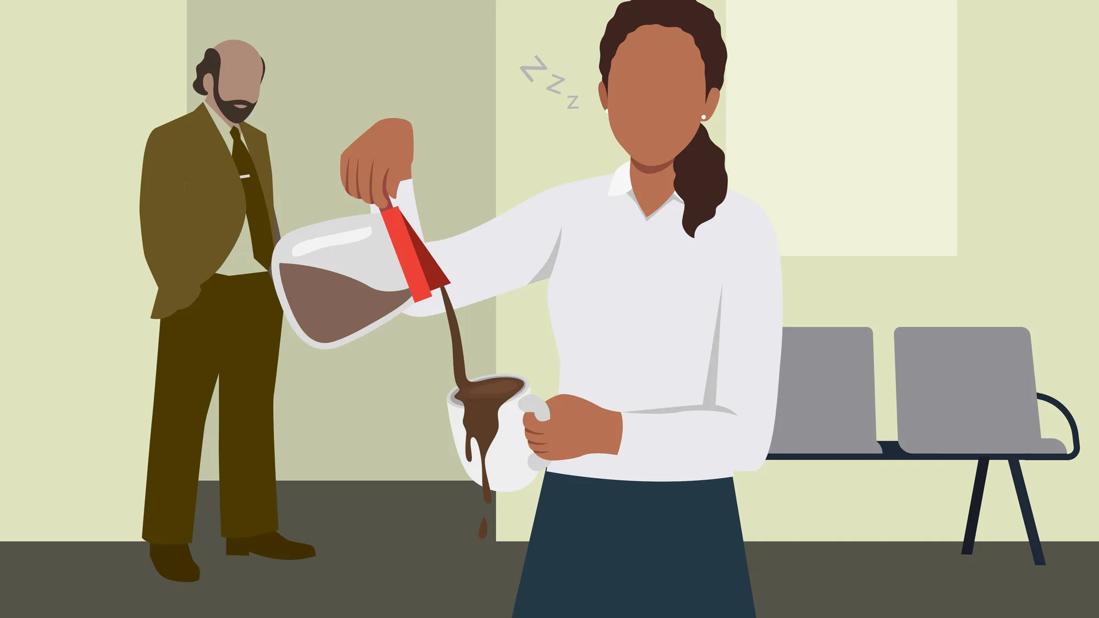Working beyond your limits can increase illnesses and accidents related to your physical and mental well-being

Image content: This image is available to view online.
View image online (https://assets.clevelandclinic.org/transform/1c77b4ef-6f96-4767-8f38-f25461ee50a9/over-worked-tired-2024547414)
Person half asleep at work, overpouring coffee into cup, while boss watches
Research suggests working more than 55 hours a week can have negative effects on your health — and it’s no wonder. When we sacrifice our health and personal responsibilities for overworking, we give up more than just our time and energy. Our relationships can become strained, our mental health can falter and our bodies can become overwhelmed with stress.
Advertisement
Cleveland Clinic is a non-profit academic medical center. Advertising on our site helps support our mission. We do not endorse non-Cleveland Clinic products or services. Policy
Psychologist Adam Borland, PsyD, talks about the warning signs of overworking and why it takes such a toll on your body.
Overworked describes the experience of working beyond your limits. You work too hard, too long and too often. As a result, you experience physical and mental harm that can lead to burnout and exhaustion.
Overworking is subjective. That means you can experience it in a number of different ways.
For full-time employees, overworking could mean you work well beyond what you signed on to do or what is expected of you. As a result, you might sacrifice evenings and weekends to complete your job.
For others, like part-time workers, shift workers and people working multiple jobs, overworking could mean you’re taking on too much responsibility and it’s taking a toll on your overall health.
You can also be overworked at school or home if your mental and physical investment in these areas is beyond what’s healthy for you.
“It’s important to try to maintain a healthy life-work balance. But this is often easier said than done,” recognizes Dr. Borland. “If your work demands are negatively affecting your life, both in and out of your job setting, you may need to evaluate why it’s happening and what changes can be made.”
Advertisement
An unhealthy work-life balance hits people in a number of ways. If you’re sacrificing self-care, time off and other responsibilities you have to your personal health to make way for overworking, you could notice the following signs:
“There may be an expectation of doing more with less, which may result in employees experiencing increased stress, anxiety, pressure and the potential for burnout,” says Dr. Borland.
When you’re overworked, you push your mind and body past its limits. Working too hard for too long can negatively impact your physical and mental health. As a result, you may experience increased risk of:
“A car doesn’t perform optimally when its gas tank is on empty,” illustrates Dr. Borland. “In the same way, our health becomes compromised when our physical and emotional reserves are tapped out.”
If things aren’t improving after you try to establish healthy boundaries and make room for self-care, you may be dealing with a toxic work environment. In these cases, it can help to work with a therapist or behavioral health coach who can guide you on how to manage these conflicts.
In therapy, you can learn how to find healthy solutions when your workload becomes overwhelming. You might even find workarounds for some of the most menial tasks.
“It’s not uncommon for self-care to be misconstrued as selfish,” understands Dr. Borland. “We need to adjust that type of mindset. I encourage my patients to carve out time for self-care each and every day, with the goal of prioritizing emotional and physical well-being.”
Advertisement

Sign up for our Health Essentials emails for expert guidance on nutrition, fitness, sleep, skin care and more.
Learn more about our editorial process.
Advertisement
Try breaking down tasks into manageable to-do lists and relying on time management techniques
Help calm the angst that can come with the start of a new work week by adopting a positive mindset, planning an activity and getting some exercise
Taking a stand throughout the day can lower your risk of disease while improving your energy, focus and productivity
A hostile work environment can foster a culture of aggression, doubt and negativity that’s harmful to your health and success
Not having paid sick leave, working night shifts and lacking consistency in schedule or pay can cause serious psychological distress
Schedule breaks, stand and stretch, and rely on alarms, to-do lists and other tools to help keep you focused
Work burnout can leave you exhausted and frustrated at work and beyond, but you can beat it by setting boundaries and surrounding yourself with positivity
Decide what you’re OK sharing, respect others and speak up if you feel uncomfortable
Although it could be used as a moisturizer, this new trend is not recommended
Communicating clear limits helps protect your time, energy and emotional well-being
High cholesterol can be genetic, but testing and treatment can lower your heart disease risk